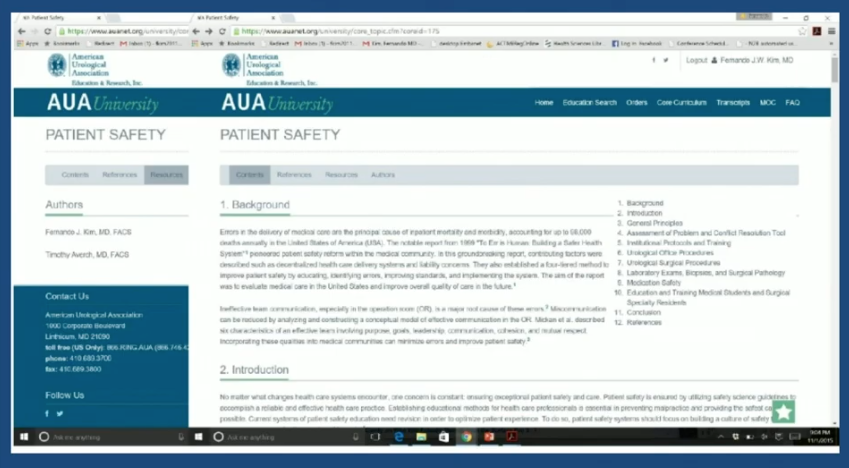Fernando J. Kim MD, MBA, FACS, presented “Culture of Patient Safety” at the 39th Annual Ralph E. Hopkins Urology Seminar on January 30th, 2019, in Jackson Hole, Wyoming.
How to cite: Kim, Fernando J. “Culture of Patient Safety” January 30th, 2019. Accessed [date today]. https://grandroundsinurology.com/culture-of-patient-safety-2/
Culture of Patient Safety – Summary:
Fernando J. Kim, MD, MBA, FACS, reviews the historical events contributing to the emergence of patient safety as a healthcare discipline. He describes efforts in the urologic field, specifically from the American Urological Association (AUA), to advance the culture of patient safety.
Abstract:
In the present era, job security in the urologic field relies on much more than the possession of medical qualifications. Maintaining a successful career as a physician requires business management expertise, practicing proper behavior in physician/patient interactions, and an emphasis on patient safety.
The principal of patient safety became a significant topic in public discourse in 1982 due to a televised exposé centered around anesthetic accidents. This created an awareness of medical errors in the American public, eventually prompting the American Society of Anesthesiologists (ASA) to establish the Anesthesia Patient Safety Foundation (APSF). By using this term in the name of a professional reviewing organization, anesthesiology became the leading medical specialty addressing issues of patient safety, and brought legitimacy to the topic.
Following these events, the historical seminal report To Err is Human: Building a Safer Health System, released in 1999, showed that up to 98,000 preventable deaths occur annually due to errors in hospitals, with about 7,000 preventable deaths related to medication errors alone. Within two weeks of the report’s release, the United States government began studies on the feasibility of implementing the report’s recommendations.
Since then, patient safety has emerged as a healthcare discipline that emphasizes the reporting, analysis, and prevention of medical errors. This discipline has amassed a transdisciplinary body of theoretical research and literature that continually informs patient safety improvement efforts relating to business and industry, adopting innovative technologies, educating providers and consumers, enhancing error reporting systems, and developing new economic incentives.
Directing this conversation to the specific field of urology, the AUA developed a core curriculum for urologic care providers on applying appropriate patient safety procedures in practice. The AUA has also released white papers on considerations of optimal care in the pre-operative, intraoperative, and postoperative settings.
About the Ralph E. Hopkins Urology Seminar
The Ralph E. Hopkins Urology Seminar, or Jackson Hole Seminars (JHS), is a multi-day conference that focuses on patient safety and cutting-edge updates in the assessment, diagnosis, and treatment of urologic conditions. The topics discussed include urologic cancers, stone disease, urologic reconstruction, female urology, infertility, emerging surgical techniques, and general urology. In addition to didactic expert lectures, this conference features unique interactive critique panel. Dr. Kim presented this lecture during the 39th Annual JHS. Please visit this page in order to register for future JHS meetings.
ABOUT THE AUTHOR
Fernando J. Kim, MD, MBA, FACS, is president of the South Central Section of the American Urological Association (SCSAUA), editor-in-chief of AUA NEWS in Portuguese, and associate editor of the Journal of Urology Plus and the Patient Safety in Surgery Journal. Dr. Kim previously served at Denver Health Medical Center where he was chief of urology and has also played a pivotal role in enhancing urological resident rotations by serving as the site residency director and significantly enhancing diversity and inclusion. Dr. Kim earned his MD from the University of São Paulo School of Medicine in São Paolo, Brazil. He was a trauma research fellow at the University of Colorado (CU) Health Sciences Center in Denver and completed an internship in general surgery at the CU Health Sciences Center. Dr. Kim also completed general surgery training at Loyola University's Stritch School of Medicine in Illinois and a fellowship in endourology and laparoscopy at the Brady Urological Institute at the Johns Hopkins University School of Medicine in Maryland.
Dr. Kim is active in the AUA as part of their leadership program, served as their host country liaison, and was awarded their Presidential Citation for his international relations and contributions to minimally invasive urological surgery. Dr. Kim served as president of the SCSAUA. He also received the Presidential Juscelino Kubitschek Medal from the Society of Brazilian Urology, the Ernest E. Moore Trauma Award, and the Societá Italiana di Urologia International Guest Recognition.

